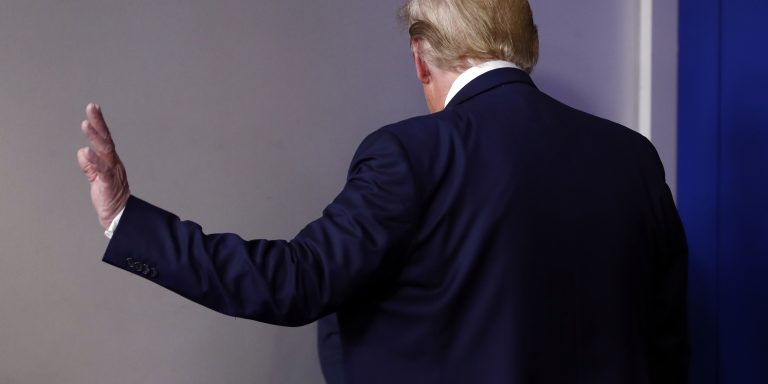INTELBRIEF
March 30, 2020
IntelBrief: The U.S. Leadership Void Limits the Global Response to COVID-19

- Just as U.S. national leadership failures degrade the Federal government’s ability to confront the coronavirus at home, the Trump administration has also failed to secure substantive international support to counter the pandemic.
- By not utilizing the assets of the World Health Organization, in part due to deep-seated distrust of international bodies, the Administration wasted critical time that could have helped stem the spread of COVID-19.
- By devaluing international institutions and failing to push forward a substantive agenda at the G-7, G-20, or the UN, the United States has squandered the potential for a global, coordinated response to find solutions to the COVID-19 crisis.
- The U.S. Administration’s isolationist and xenophobic tendencies are likely to make it more difficult to achieve lasting solutions to a health crisis that can best be solved via unity of effort.
.
As the COVID-19 pandemic accelerates and the international system shifts toward multipolarity, the United States’ ability to lead in a global crisis has been called into question worldwide. The Trump administration has, reverted to its long-held isolationist tendencies, at a time when countries across the globe are turning elsewhere for solutions amid the COVID-19 crisis. The United States, one of the five permanent member countries of the 15 member United Nations Security Council and the top financial contributor to the United Nations (UN) worldwide, has historically exerted a disproportionate amount of influence over multilateral institution decision-making. Today, Washington’s decline in global influence is a self-inflicted wound that can be attributed, at least in part, to the Trump administration’s devaluing of international bodies. Diminishing U.S. influence worldwide, coupled with the adversarial posture the United States has assumed at international meetings, has exacerbated worldwide tensions and contributed to the attenuation of American influence.
A symptom of U.S. government distrust of international bodies dangerously manifested when the United States chose not to acquire COVID-19 diagnostic tests produced by the World Health Organization (WHO). Early in the crisis, the Trump administration maintained that its preference was to produce its own COVID-19 tests. While the Administration commented that the tests were allegedly flawed, millions of these tests were reportedlysent to countries around the world to increase testing capacity and flatten the curve. It is now well documented that the capacity of the United States to put forward an alternative was severely lacking. Whether resulting from misplaced pride or a policy error rooted in overestimating internal production capacity, the U.S. decision to go it alone has jeopardized the health of millions of Americans. Aggressive screening efforts, through testing, could have slowed the spread of the novel coronavirus. Just as the Administration ignored January 2020 intelligence community warnings of a looming global pandemic, recent reporting also indicates that meetings convened in the White House situation room allocated insufficient focus on the importance of testing.
U.S. waning influence within international bodies was on full display last week when the G-7 failed to issue a meaningful statement regarding the COVID-19 crisis. The United States, represented by U.S. Secretary of State Mike Pompeo, pushed for a statement that would label COVID-19 as the ‘Wuhan Virus.’ It was because of Washington’s push for this label that the G-7 failed to reach a consensus statement regarding the pandemic and how to address it globally. The State Department’s insistence on calling the coronavirus the ‘Wuhan virus’ is not surprising given similar semantics from President Trump, who consistently calls COVID-19 the ‘China Virus’ in an effort to distract attention from his administration’s dangerous ineptitude in response to COVID-19. Instead of exerting leadership on an important world-stage like the G-7, the United States squandered any potential goodwill or support as it becomes ground zero for COVID-19. Later in the week following the G-7 fiasco, the G-20, representing the world's top economic powers, barely did better due to U.S.-Sino fissures. The United States and China have engaged in back-and-forth finger pointing as Beijing has ramped up propaganda and disinformation efforts to blame the spread of the coronavirus on other countries, including the United States. Following the G-20 meeting, the group issued a bland statement, long on platitudes but short on deliverables and falling short of offering help or hope for a world of 8 billion people looking for respite under siege from a pandemic.
Aside from a recent call by the UN Secretary General Antonio Guterres for $2 billion to help the world’s poorest countries, the UN has been sidelined during the COVID-19 pandemic. The inertia afflicting the UN stands in contrast to the UN’s decisive action following the September 11, 2001 terrorist attacks, another major international event that shook the world’s conscience, like COVID-19. In the wake of 9/11, the United States worked with international counterparts at the UN to pass multiple Security Council and General Assembly resolutions and frameworks. While the threat posed by COVID-19 is not analogous to that of terrorism, U.S. disinterest in working with the world’s most important multilateral body exemplifies an important point – the void of U.S. leadership on a global crisis will make it harder to garner the international collaboration necessary to stem the COVID-19 pandemic that has left thousands dead in its wake and will kill many more.
.
For tailored research and analysis, please contact: info@thesoufancenter.org